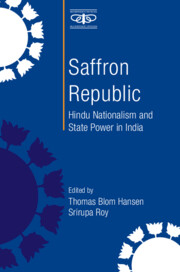9 - From Castes to Nationalist Hindus: The Making of Hinduism as a Civil Religion
Published online by Cambridge University Press: 31 May 2022
Summary
A Hindu is not a Hindu because he accepts certain doctrines or philosophies, but because he is a member of a caste. (Hinnells and Sharpe 1972)
In November 2019, the above epigraph from Hinnells and Sharpe (1972) was proved right in Karnataka, as the state witnessed another case of caste-related killings when a couple was hacked to death for intercaste marriage. The man belonged to Madar caste and the woman to Lamani caste. While both are listed as Scheduled Castes, or SCs (ex-untouchables) in Karnataka, Lamanis consider themselves to be higher than Madars, and it was the Lamanis who were accused of murdering the couple. Violence among SCs is, however, rare in India. Caste may construct what Frederick Bailey calls ‘civility of indifference’ in rural India (Bailey 1996), and instances of full-scale intercaste wars are indeed rare. However, transgressions that violate ritual and hierarchical order result in intercaste violence, and ex-untouchable castes are mostly at the receiving end.
In this chapter, I engage with the question of new Hindutva by revisiting an old conflicting distinction set up by Ashis Nandy between Hindutva and Hinduism (Nandy 1991). While Nandy hoped for an end of Hindutva at the hands of Hinduism, the former has not only survived but grown leaps and bounds. A foundational problem with those who place faith in Hinduism for fighting Hindutva is their overlooking of the caste question. I approach new Hindutva by locating caste at the centre of popular Hinduism and thereby distinguishing it from Hindutva. Hindutva has historically pursued a nationalist critique of caste and thus has been part of the Hindu-modernizing/reform process (Bayly 1988). I engage with the contemporary forms of engagement with caste in Hindutva's ideology-building to unravel the making of Hinduism as a civil religion.
Caste, though weakening, continues to substantially define the selfhood of most Hindus in rural and urban India (Waghmore 2018, 2019). Anti-caste discourse is all-pervasive in movements that mobilize around Phule–Ambedkarite ideology and the imagined bahujan collective identity (Waghmore 2013). Left movements are also now setting foot into anti-caste politics. Hindu nationalists engage with the problem of caste by resorting to a discourse and politics of Hindu unity and humanism across castes.
- Type
- Chapter
- Information
- Saffron RepublicHindu Nationalism and State Power in India, pp. 199 - 218Publisher: Cambridge University PressPrint publication year: 2022
- 1
- Cited by

